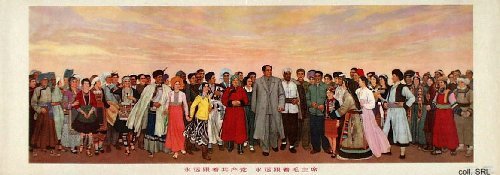The Quotations from Chairman Mao, the Mao zhuxi yulu (毛主席语录), 426 in total, were culled from the numerous writings in which Mao had set out to sinify Marxism-Leninism over the years and which had been brought together in the four-volume Selected Works of Mao Zedong. Already in Yan'an, Mao was styling himself as the sole theoretician of Chinese communism, on a par with and later even superseding, Marx, Engels, Lenin and Stalin. As a result of Mao's (re-)interpretations of the Marxist Classics, his writings became known as Mao Zedong Thought. The Quotations were first published in 1961 for use in the People's Liberation Army under Lin Biao.
 In the early 1960s, and during the first phase of the Cultural Revolution, the PLA played a major role in the popularization of the Quotations. According to Lin, "Everything that Mao Zedong says is the truth; every statement he utters is worth 10,000 sentences." The more wide-spread the study of the book, the more devastating the effects that were ascribed to it. In 1960, Mao Thought was seen as an arrow aimed at the target of revolution; by 1965, the Quotations were seen as a mighty "ideological weapon" in the struggle against imperialism, revisionism and dogmatism. One year later, Mao Thought had grown into a "spiritual atom bomb" of infinite power.
In the early 1960s, and during the first phase of the Cultural Revolution, the PLA played a major role in the popularization of the Quotations. According to Lin, "Everything that Mao Zedong says is the truth; every statement he utters is worth 10,000 sentences." The more wide-spread the study of the book, the more devastating the effects that were ascribed to it. In 1960, Mao Thought was seen as an arrow aimed at the target of revolution; by 1965, the Quotations were seen as a mighty "ideological weapon" in the struggle against imperialism, revisionism and dogmatism. One year later, Mao Thought had grown into a "spiritual atom bomb" of infinite power. Although printed in staggering numbers (some 740 million by 1968), the "Little Red Book", as it became known in the West, was not the only medium through which Mao Zedong Thought was spread. The Renmin ribao (People's Daily), the mouthpiece of the Party, carried a daily changing Mao-quote printed in red in its masthead, to supplement the abundant number of quotes in boldface which peppered the articles. A number of quotes were reproduced on posters and these were given the place of honor wherever they were displayed.
Although printed in staggering numbers (some 740 million by 1968), the "Little Red Book", as it became known in the West, was not the only medium through which Mao Zedong Thought was spread. The Renmin ribao (People's Daily), the mouthpiece of the Party, carried a daily changing Mao-quote printed in red in its masthead, to supplement the abundant number of quotes in boldface which peppered the articles. A number of quotes were reproduced on posters and these were given the place of honor wherever they were displayed.
 Regularly, so-called Chairman Mao's Latest Instructions were published. These utterings of profound wisdom were to be welcomed with great fanfare, with gongs and cymbals. All work was stopped, and people were even told to get out and hail their arrival in the streets.
Regularly, so-called Chairman Mao's Latest Instructions were published. These utterings of profound wisdom were to be welcomed with great fanfare, with gongs and cymbals. All work was stopped, and people were even told to get out and hail their arrival in the streets.


No comments:
Post a Comment